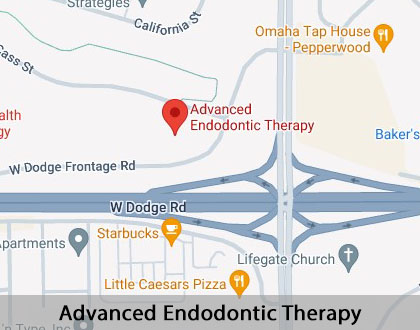What Do Endodontists Do? Omaha, NE
Endodontists are specialized dentists focused on performing root canals and treating the interior of the tooth (known as the "pulp") down to the tip of the root or "apex." In addition, endodontists are specially trained diagnosticians who carefully plan endodontic treatments and manage pain. An endodontist has a deep understanding of tooth pain and how to relieve it at its source.
If you are curious about what an endodontist can do for you, let Advanced Endodontic Therapy in Omaha help. Our team offers a range of endodontic procedures, including root canals treatments, so call us at (402) 506-7111 to learn more.
Endodontist Explained
An endodontist specializes in diagnosing complex tooth pain and performing root canal procedures and other treatments related to the tooth interior. The word "endo" means inside, and the word "odont" means tooth. On the other hand, a dentist tends to the exterior of the tooth, like cleaning teeth, filling cavities, and placing sealants. Endodontists must complete an additional two years of advanced training beyond the four years of dental school. Only a small number of dentists go on to specialize in endodontics.
“An endodontist specializes in diagnosing complex tooth pain and performing root canal procedures.”
Root Canal Treatment and Retreatment
A root canal procedure delicately removes the tooth pulp if it becomes inflamed or infected. The space inside the root canal is cleaned, filled, and sealed. In some cases, a post is placed inside the canal to hold the tooth in place. Following a root canal, the dentist will place a crown or other restoration on the treated tooth for protection and to restore function. A root canal can last a lifetime if taken care of it. However, if the tooth fails to heal or becomes reinfected, endodontic retreatment may be required.
The pulp contains nerves and blood vessels that extend down to the tip of the root where it connects to surrounding tissue, making this area especially sensitive. An endodontist focuses exclusively on issues that affect the dental pulp, performing an average of 25 root canals a week versus a general dentist who completes an average of two.
“A root canal procedure delicately removes the tooth pulp if it becomes inflamed or infected.”
Apicoectomy
An apicoectomy—also known as root end surgery—is a procedure in which the apex of the tooth's root is completely removed. This procedure may be needed even if the patient has already had a root canal treatment. If residual inflammation or infection reaches the root tip, it can spread into the surrounding tissue of the jawbone, potentially causing severe complications.
An apicoectomy procedure is more invasive than a root canal and may cause pain. An endodontist is, therefore, the preferred specialist to see. Not only are they trained to treat the deep parts of the tooth, but they are also highly skilled in pain management.
“An apicoectomy—also known as root end surgery—is a procedure in which the apex of the tooth’s root is completely removed.”
Check out what others are saying about our dental services on Yelp: What Do Endodontists Do? in Omaha, NE
Treating Dental Trauma
Endodontic treatment is typically recommended for serious dental injuries and dental trauma. Endodontists are well-suited to treat dental traumas like knocked-out teeth or severe dental fractures. They have extensive training in pain management and use specialized techniques that help keep patients comfortable during complex or painful dental procedures. In addition, endodontists are skilled at administering numbing medications. They even have experience helping patients who have trouble getting or staying numb.
“Endodontists are well-suited to treat dental traumas.”
Questions Answered on This Page
Q. What does an endodontist do?
Q. What happens in a root canal treatment?
Q. Can an endodontist treat dental trauma?
Q. How do endodontists diagnose tooth pain?
People Also Ask
Q. How should someone prepare for endodontic therapy?
Q. What is the difference between a dentist and an endodontist?
Q. What are some of the most common endodontic procedures?
Q. What are some more complex endodontic procedures?
Testing the Health of Teeth
Endodontists receive training in the advanced diagnosis of deep tooth pain. They use special tests designed to assess pulp and root anatomy. Pulpal diagnostic tests detect the status of the pulp tissue, including how the tooth responds to cold or heat. Periapical diagnostic tests determine the status of tissues surrounding the tip of the root, including if the tooth is sensitive to percussion (a simulation of biting down). These tests reveal the extent of damage to the dental pulp and surrounding tissue. Radiographic and 3D imaging can help verify the presence of infection or disease.
A correct endodontic diagnosis is extremely important for guiding endodontic treatment planning. It also helps in determining whether the pulp tissue is vital or necrotic. Treatment options differ according to status.
“A correct endodontic diagnosis is extremely important for guiding endodontic treatment planning.”
Frequently Asked Questions
Q. What services do endodontists provide?
A. Though a root canal tends to be the most common procedure, endodontists provide a number of services. For example, they treat dental traumas, diagnose tooth pain, and perform endodontic surgeries to save teeth. They even perform root canal retreatment in the rare case it is needed.
Q. How expensive is endodontic surgery?
A. This question is answered on a case-by-case basis. Many dental plans cover at least a portion of the procedure because it is considered medically necessary. Patients are advised to check with their dental insurance provider for details. If cost is an issue, payment plans may be available.
Q. Does it take long to recover from endodontic treatment?
A. Many people discover they can return to their regular daily activities after a procedure. However, this depends on the extent of work done. An important thing to remember is to avoid eating until the numbness goes away and be prepared for some sensitivity for a few days after.
Q. How do endodontists diagnose tooth pain?
A. Diagnosis is a major part of endodontic treatment planning. The diagnosis reveals the extent of the dental pulp and apical damage. This is determined through temperature and pain sensitivity measures.
Q. How do I find an endodontist in your area?
A. Your dentist may be able to recommend an endodontist. Family and friends are also excellent sources of recommendations. However, if you are new to an area, the internet is a valuable resource. You can read reviews of local endodontists before you schedule an appointment.
Start Feeling Better – Visit Us Today
By visiting us as soon as possible, our team can help get you the professional treatment you need. Instead of waiting around and allowing the symptoms to get worse, we can provide you with treatment options.
Definitions
Learn More About Endodontists
Endodontists specialize in dental problems that affect the inside of the tooth and the root. It is important to seek out an endodontist if a tooth is infected. They can discover and treat the extent of infection before the disease spreads to the jawbone. In addition, an endodontist has expertise in pain management techniques and is well-suited to treat extreme dental trauma.
If you are in search of an endodontist in Omaha, let Advanced Endodontic Therapy help. Call us at 402-506-7111 to learn more about our services and policies.
Helpful Related Links
- American Association of Endodontists. Why See An Endodontist. 2024
- Decisions in Dentistry. Principles of Endodontic Diagnosis. 2024
- Healthline. Pain After Root Canal. 2024
- Mayo Clinic. Root canal treatment. 2024
- Medline Plus. Dental Exam. 2024
- National Library of Medicine. Apexification: A systematic review. 2024
- ScienceDirect. Endodontic Surgery. 2024
- WebMD. What to Know About an Apicoectomy. 2024
About our business and website security
- Advanced Endodontic Therapy was established in 2008.
- We accept the following payment methods: Cash, Discover, MasterCard, and Visa
- We serve patients from the following counties: Douglas County, Dodge County, Lancaster County, and Sarpy County
- We serve patients from the following cities: Omaha, Benson, Florence, Bellevue, Fort Calhoun, Papillion, Lincoln, Bennington, Plattsmouth, Fremont and Elkhorn, Missouri Valley, and Council Bluffs
- Norton Safe Web. View Details
- Trend Micro Site Safety Center. View Details
Back to top of What Do Endodontists Do?










